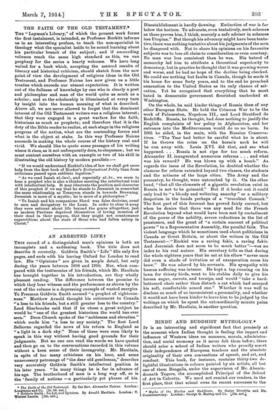THE FAITH OF THE OLD TESTAMENT.* THE "Layman's Library," of
which the present work forms the first instalment, is intended, as Professor Burkitt informs us in an interesting preface, to teach the non-specialist in theology what the specialist holds Was sound learning about his particular branch of the subject; and if succeeding volumes reach the same high standard as this, we can prophesy for the series a hearty welcome. We have long waited for a book which, accepting the assured results of literary and historical criticises, should sketch from the new point of view the development of religious ideas in the Old Testament, and Professor Nairne has now given us a little treatise which exceeds our utmost expectation. It is written out of the fullness of knowledge by one who is clearly a poet and philosopher and man of the world quite as much as a scholar; and so the scholarship is illuminated at every turn by insight into the human meaning of what is described. Above all, we are never allowed to forget that the dominant interest of the Old Testament writers was a religious interest ; that they were engaged in a great warfare for the faith, historians as much as prophets; and therefore that it is the duty of the Bible reader to realize, at each stage in the religious progress of the nation, what are the contending forces and what is the object at stake. In this way Professor Nairne succeeds in making the whole course of the history real and vivid. We should like to quote some passages of his writing where it rises, as it not unfrequently does, to eloquence ; but we must content ourselves with an example or two of his skill in illustrating the old history by modern parallels :— "If we would understand Ezekiel's idea of law we shall get snore help from the first book of Hooker's Ecclesiastical Polity than from criticisms passed upon rabbinic legalism."
"As we read Isaiah xl.-lxvi., and especially al.-1v., we seem to hear a prophet who is also a thinker meeting the intellectual trial with intellectual help. It may illustrate the position and character of this prophet if we say that he stands to Jeremiah in somewhat the same relationship as Tennyson stands in towards Browning. Jeremiah is more of a mystic; he is more of a philosopher."
"To Isaiah and his companions Sheol was false doctrine, cruel to men and derogatory to the LORD. In order to clear it away they were reticent about life beyond the grave altogether, just as modern Puritans deprived themselves of loving mention of their dead in their prayers, that they might not countenance superstitions about the state of those who had fallen asleep in Christ."














































 Previous page
Previous page